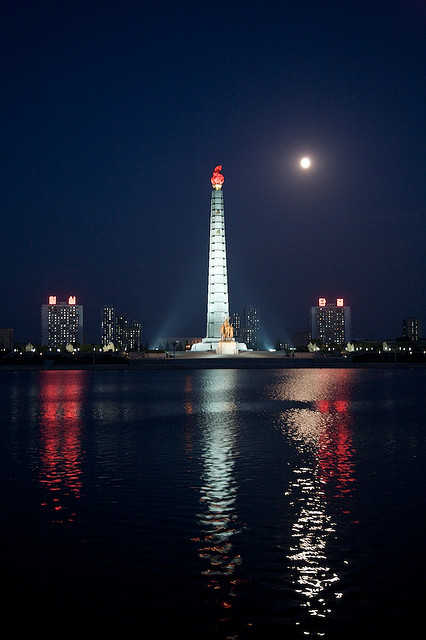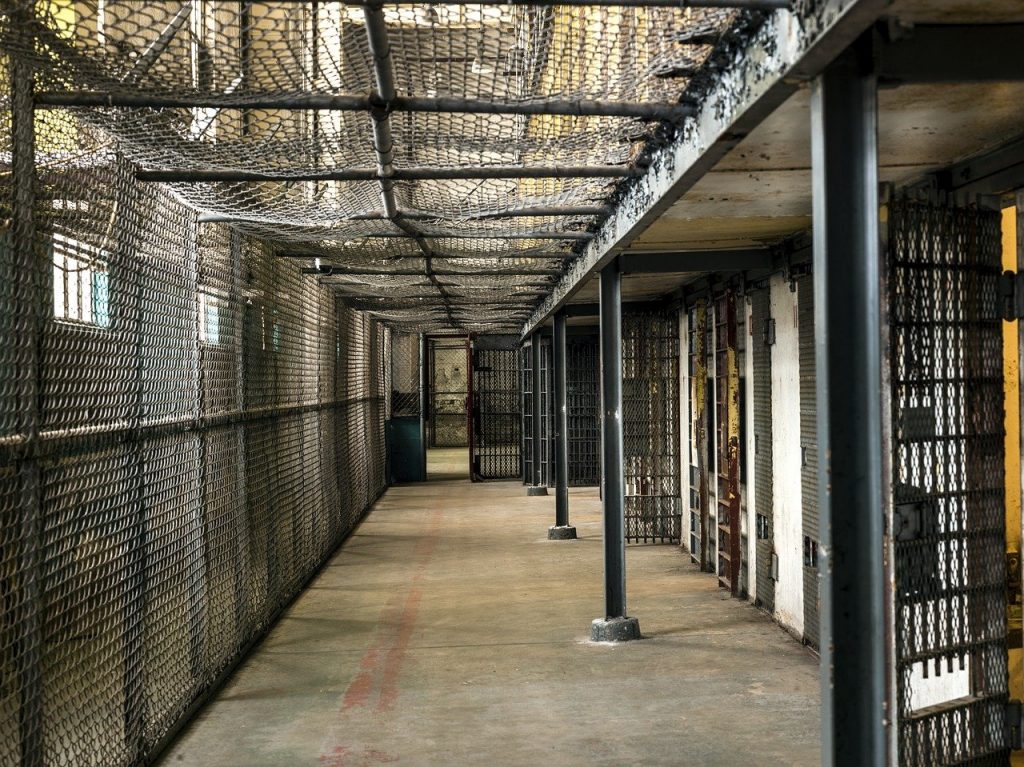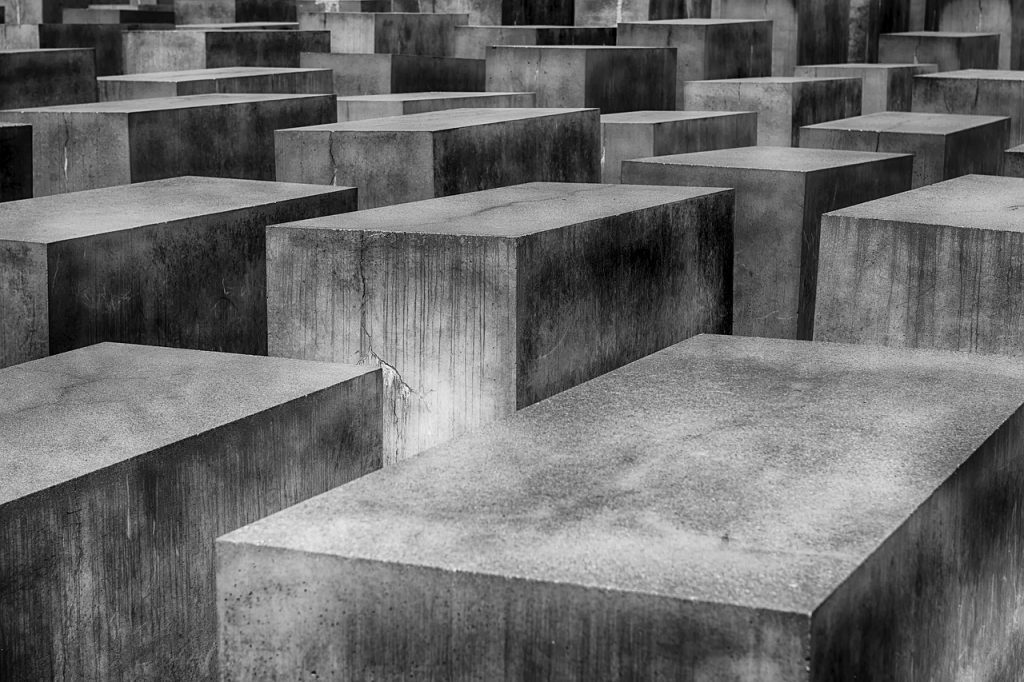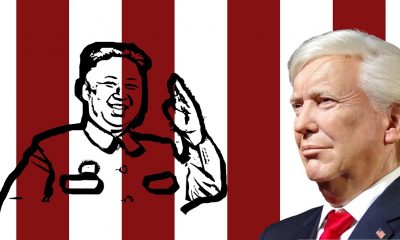Opinion
North Korea Loses Popularity in Russia, Where is the Conflict Heading?
Soviet Union and China who were the closest allies of North Korea during cold war era, now doesn’t show much interest in aiding the nation. The prominence of North Korea among Russians has almost reduced by half in a month even though North Korea had never targeted Russia in their antagonistic statements.
Russia has been anxious recently about North Korea’s rogue behaviour and open warning its neighbours of missile attack. Russia is agitated to see North Korea’s refusal to stop its nuclear weapon program.
The catastrophe actualized when North Korea carried out its third nuclear bomb test in February, attracting censures from the international community resulting into tough sanctions imposed by the US. US had already cut off food aid it had been contributing as part of a denuclearization-for-aid agreement reached in 2005 when George W Bush was in power.
 |
| Mass dance in front of the Monument to Party Foundation – Pyongyang, photo by Gabriel Britto |
We found the statistics of two similar polls conducted in Russia by Public Opinion Foundation (FOM) one at the beginning of April and one at the end of it. While comparing both the poll results it is clear that now only 34% of Russians think North Korea is friendly compared to 58% in early April.
60% of respondents believe that North Korea’s nuclear arms pose a threat to other countries with 28% thinking otherwise is true, whereas 13% undecided. 44% of those who think North Korea nuclear arms pose threat to other countries believes that Russia could become a victim of such an attack.
Nearly 17% Russians believe that probability of war in the Korean peninsula is very high. Nearly 39% believe that no such war would take place no matter what developments will take place in the coming future. They are those who believe North Korea is just bluffing, trying to bring US and South Korea diplomatically on table for negotiations in its favour, and is not serious about the war. There were also 25% people who believe that the probability of war does exist but really low.
Not many Russians are willing that their country should provide aid to their once major communist ally in the east. Only about 8% believe that Russia should offer its support to Pyongyang in case of any escalated conflict. However, Russians also do not believe much in supporting North Korea’s opponent. Only 4% of the respondent said their country should support North Korea’s supposedly opponents The majority of Russians hold that their country should remain neutral on the developments in the Korean peninsula.
 |
| Pyongyang’s brightest lit spot. photo by fresh888 |
Japan on the other hand is taking extra precautions. Many Japanese agencies have drafted alert emails and tweets already so that at the time of any action by North Korea there should not be any delay in alerting its citizen. This has also resulted into sending false alarm alerts of North Korea launching ballistic missiles by mistake. On Friday, North Korea had admonished that Japan would be its primary target in case war breaks out on the Korean Peninsula, blaming Japan for its “hostile posture.” North Korea also threatened Japan that it would strike it with nuclear bomb if Japan intercepts any North Korean test missiles.
Russian officials have denied that they foresee any escalated conflict between North and South Korea. The country who can initiate the conflict would be North Korea, who knows that South Korea got the backing of big powers like Japan and USA and its allies in West Europe. North Korea is also aware that Russia and China at the time of conflict will not be able to provide anything more than diplomatic support and negotiations to end the war. China and Russia will not come to help militarily. Deputy secretary of Russia’s supreme security body – the Security Council, Yevgeniy Lukyanov who is in the office since 2010 gave the statement this week that no one would gain anything from such war and therefore it will never happen.
He also mentioned to the press that new North Korea’s leader Kim Chong un is a very young leader and if he wishes to rule the country for long then he is required to avoid escalating unnecessary risks and threats. On the other hand North Korea is not only moving its missiles to the border of South Korea but also creating anti tank barricades, creating panic and situation of the war, highlighting the whole conflict and region in the world.
However one must note that it was last week when Pyongyang demanded that South Korea and the USA should remove all nuclear weapons from the region, thus preparing the setting for any possible future dialogue. Both Seoul and Washington rejected this demand as ludicrous.
USA has also rejected North Korea’s demand to recognize it as a nuclear weapon state saying one of the main conditions for lifting sanctions on Pyongyang is its abstaining from nuclear ambitions. The plight were immediately belittled as unacceptable by North Korea’s Rodong Sinmun newspaper on Tuesday. “If the Democratic People’s Republic of Korea [DPRK] sits at a table with the US, it has to be a dialogue between nuclear weapons states, not one side forcing the other to dismantle nuclear weapons,” the newspaper said.
 |
| Photo by Stephan |
Author and Asia specialist Tim Beal believes that it is America’s fault in renewing the tensions in the Korean peninsula. New South Korean president, Park Geun-hye whose mother was killed by a North Korean and whose father was killed by his spy chief decided to work for peace with North Korea after sworn-in just over a month ago. The Americans upped the ante with current range of military exercises with South Korea, in order to stop the new South Korean government engaging with the North as Park Geun-hye had promised in her election campaign.
Tim Beal also compared the current situation of US and North Korea with that of US and India. Earlier U.S had also put sanctions on India for developing weapons and for being outside of Non-Proliferation Treaty. Sanctions included economic and blacklisting Indian scientific organizations and not allowing any country to transfer any sensitive technology to India, which made India to develop on its own. Once India already had made good progress, and started looking like a potential super power, Bush administration in 2005 compromised on India and bypassed the Non-Proliferation Treaty and established Indo-US civil nuclear deal giving India exemption from NPT and recognizing it as a nuclear weapon state.
But one must know that India has a good proliferation record, India never provoked any country for nuclear war and never threatened to use it even against its rival Pakistan whose army had illegally entered Indian side and occupied the heights in Kargil in 1999 just after both the countries tested their nuclear bombs. India also maintains a no first use policy, that means India in no manner will attack a country first with a nuclear bomb therefore India keeps sophisticated technologies like anti ballistic missile which can thwart any attempt by any country to deliver nuclear bombs through ballistic missiles. India also maintains second and third strike capabilities through its canister launched nuclear missiles and submarine launched nuclear missiles.
China
Nepal Hindu Rashtra: Time to Wrap Up Communism?

Nepal abolished the Constitutional Monarchy in May 2008 and declared itself as a Federal Democratic Republic. There was a new hope in Nepal as it was becoming world’s newest democracy even though it had dissolved the Hindu Rashtra. However, the democracy in Nepal immediately got into the tight grips of leftists and communists backed by China. It has been almost 12 years since monarchy was abolished in Nepal. Interestingly, the Himalayan country has already seen 11 Prime Ministers in this period. Thus, leaving the Nepalese people still yearning for good and stable governance.
Re-establish Hindu Rashtra
As the political instability is growing in Nepal, people are demonstrating concerns about the future of the country. In fact, Nepalese citizens are unhappy with frequent interference by China and India influencing its unstable communist regime. More voices are now growing in support of reinstating the Monarchy and declaring Nepal as world’s only Hindu Rashtra (which by default offers full religious freedom to other religious minorities as per Hindutva concept of Sarva Dharma Sama Bhava – all paths lead to one).
Former Deputy Prime Minister of Nepal, Kamal Thapa said that if political parties do not recognize the seriousness of reinstating the monarchy, then the country will head for a period of darkness. “Recently, we’ve had high-ranking officials from India and China come to Nepal to try and solve problems within the ruling party,” he said. “We cannot let others dictate what we want to do.”
Communist Party All Set to Suppress Protests, By Force
Kamal Thapa has firmly demanded an all party meet to discuss reinstating of monarchy. Throughout the month of December, 2020 Nepal has seen anti communism protests across the country in support of reinstating the monarchy and Hindu Rashtra. Most importantly, the demand has become a nationwide mass people’s movement. So much so that the communist regime had to send a directive to 77 districts in 7 provinces. The directive suggests suppressing the protests by force. Nevertheless, Rashtriya Prajatantra Party and other royalist groups have ignored this threat from the communist regime. Protester groups have pledged to strengthen the protest in the coming weeks.
Nepal: Demonstration held in capital Kathmandu, demanding restoration of monarchy in the country. pic.twitter.com/TFjmKu9U9Z
— ANI (@ANI) December 5, 2020
Role of China – Hope for Communism in Nepal
China’s ambassador to Nepal is known to have very close relationship with Nepalese Communist regime. In fact, She has been super effective in tilting Nepal’s posture towards its ideological partner, China. One of her greatest achievements in 2020 was artificially manufacturing a border conflict between Nepal and India. Consequently, souring relations between the two Hindu majority nations. In addition, she managed to silence Nepal’s communist government after China took one of Nepal’s border villages under its control. However, recent political turmoil in Nepal and a renewed demand for reinstating of Hindu Monarchy is showing that the situation is now out of Chinese hands
Role of India
Year 2020, was not a good year for India and Nepal relations. India was busy in controlling domestic Covid cases. On the other hand, China had launched an invasive campaign into Indian territory. In addition, India is always busy with Pakistan on its western borders. However, the surprise came to India when China was almost successful in creating a new border tension between India and Nepal.
Those who do not know about Indian government should note that the current ruling party in India finds itself ideologically opposite to communism. This further creates differences between the two countries.
Communist party in Nepal has blamed India for supporting the ongoing anti communism protests in Nepal. However, former advisor to Nepal’s PM has suggested there is no proof that India is fueling pro Monarchy, anti communism demand in Nepal.
Nevertheless, There are certain influencers in India who have, in their personal capacity, expressed support for reinstating the Hindu monarchy. Yogi Adityanath, who is the Chief Minister of an Indian state bordering Nepal, said in 2015 that Nepal should declare itself a Hindu Monarchy. Readers should note that in 2015 Yogi Adityanath was not the Chief Minister yet. However, today he is not only popular in south of Nepal, his popularity is growing in Nepal as well.
Will The World See the first Hindu Rashtra?
It is difficult to answer this question at this moment. However, Nepalese communist government could not resolve the political instability and in December 2020 Nepalese government dissolved the parliament. Nepal will see next elections in April – May 2021. Hopefully, the world will see Nepal’s 12th Prime Minister in 13 years or may be a Hindu King? Royalists and protester groups have expressed confidence in winning next elections. We have our eyes on Nepal for updates.
Opinion
America’s Justice System – The Need For Reform

A recent poll by the National Opinion Research Centre revealed that 95% of Americans favour vital criminal justice reforms. This is hardly surprising, given that several people of varying racial, partisan and ideological dispositions have called out the justice system over its many failures throughout the years. Most Americans received the Trump Administration’s First Step Act as a step in the right direction, as about 60% of people approved the criminal justice reform bill according to a 2018 poll. However, many people still believe the justice system’s approach to crime is ineffective and needs dire change, and these are some reasons why.
Prison population and funding concerns
Research conducted revealed America has about 2.3 million prisoners, making the US the country with the highest incarceration rate globally. Experts estimate that the country’s prison population has grown by a whopping 340% over the past three decades; new prisoner admissions into jails are higher than prisoner release numbers. The cost of maintaining the nation’s prisons at taxpayers’ expense has inspired a lot of backlash and calls for budget cuts. According to research, slashed correction spending was the preferred option by most states to balance their budgets and redirect spending to other areas.
Minimum mandatory sentences
Minimum mandatory sentences are statutes that force judges to give defendants convicted of a crime the minimum prison sentence. Mandatory sentences rob judges of the traditional way of considering the defendant’s character and the unique circumstances surrounding offences. Even when represented by criminal defense attorneys with many years’ experience, defendants often succumb to prosecutors’ pressure to plead guilty or face more severe charges with higher mandatory sentences. The guilty plea bargain consequently resolves about 95% of both federal and state court cases. Research also shows that about half of inmates in federal prisons are doing time for drug offences- causing overpopulation in the prison system.
Growing number of people killed by the police
An estimated 1000 civilians are killed by police officers annually in the US. The frequency of police brutality cases over the years requires immediate reform to the American justice system. Data suggests that the incidence of fatal police shootings is higher among African-Americans than any other ethnicity, inspiring movements like the ‘Black Lives Matter’ campaign to press on with protests for significant police etiquette reforms towards coloured minorities. The police force faces incessant accusations of racial profiling, indiscriminate use of power, and poor discretion, which has led a reported 58% of Americans to think policing needs major reforms through measures like better-trained officers, and wearing body cameras.
Evolving public opinion on crime
Research released by the Sentencing Project and The Justice Policy Institute reveals that more people in conservative states are embracing preventive, rehabilitative, and alternative sentencing options for non-violent offenders. Most Americans now view the prevention of crime as the most vital function of the justice system, as 77% of Americans think that focusing more on character education and after-school programs would be cost-effective by reducing the number of people going to jail. Almost two-thirds of Americans also believe in the need for lighter sentences with more useful, reformative programs in prisons that will benefit inmates upon release. Therefore, support for harsh penalties that harden criminals and make them a more significant menace when reintroduced into society has dwindled.
Opinion
The History Question: Is It Better to Remember or to Forget?

Years ago, a philosopher by the name of George Santayana said a phrase that fuels many debates to this day. His original saying is “those who cannot remember the past are condemned to repeat it”, although, many sources now present it as variations of “those who cannot learn from history are doomed to repeat it”. The latter definitely has more substance to it in the light of the ongoing debate about how much history we should be learning and how.
Is It Better to Remember or Forget About the Past?
On one hand, Santayana was right. Learning about the past is essential in order for people to progress. One also shouldn’t overlook the importance of remembrance and paying respects to the dead, both those who pushed the progress forward and those who have fallen victims to major tragedies that could and should have been averted.
The main argument in favor of learning about the past is that its knowledge is necessary for preventing the same thing happening in the future. Having it one can see the signs and stop the tragedy before it gains momentum.
That’s sound in theory, but the reality is always different. For example, today people are surely forgetting, and the much-critiqued education system is only partially at fault here. Even the greatest of tragedies weren’t spared this fate. It’s a proven fact that about two-thirds of millennials today don’t know about the Holocaust, and this number is surely greater for generations that follow them. In the school history course, the subject of one of the greatest disasters in history is barely touched, if touched at all. And outside of a history classroom, one can only see small, but terrifying, glimpses of it at the Holocaust Museum and other museums that rarely attract many visitors. And now we are witnessing a rise of antisemitic crime.
Are these two facts related? Does the lack of awareness about the horrors done in the name of Aryan supremacy contribute to the fact that right-winged extremists seem to be gaining popularity again?
It does, but by how much? That is the question that no one can truly answer.
And what about other genocides? The Holocaust had the highest death toll, but it was far from the only genocide in history. And quite a few of those happened after World War 2 and before the memory of the atrocities against the Jews began to fade. This means that while forgetting history is a factor, it’s not the deciding factor in its repeats.
But what is that thing responsible for the reenactment of past mistakes and tragedies?
Learning. This is the important thing that is most often overlooked when citing Santayana’s famous saying. It’s not enough to learn about the past and know the facts of things that happened. It’s important to learn from those facts and put in place protections that will prevent them from happening again. And this is something that humanity, as a whole, has yet to succeed in doing.
Dwelling in the Past Can Be Just As Bad
One also shouldn’t forget that there is such a thing as “too much history”. The Bosnian War and genocide that happened there in the 1990s is a vivid example of how the past can be exploited by political powers. Used as a part of propaganda, which fueled the war, history can become a weapon in the hands of those who want to use it for their own goals.
And this is what humans have been doing since the dawn of time. There is always someone who will use any means necessary to achieve whatever it is they wish. This results in wars and genocides, and hundreds of smaller but no less devastating tragedies.
Therefore, the problem isn’t whether people should be learning history but human nature itself. Perhaps, teaching this can help fix this fundamental flaw and truly stop the worst of the past from repeating.
-

 Business12 months ago
Business12 months agoHow To Future-Proof Your Business With The Right Tools
-

 Travel10 months ago
Travel10 months agoTravelling from San Antonio to Guadalajara
-

 Travel7 months ago
Travel7 months agoTravel wellness tips for a healthier and more enjoyable journey
-

 Europe6 months ago
Europe6 months agoRecent Books by Boaventura de Sousa Santos: Law, Colonialism, and the Future of Europe




